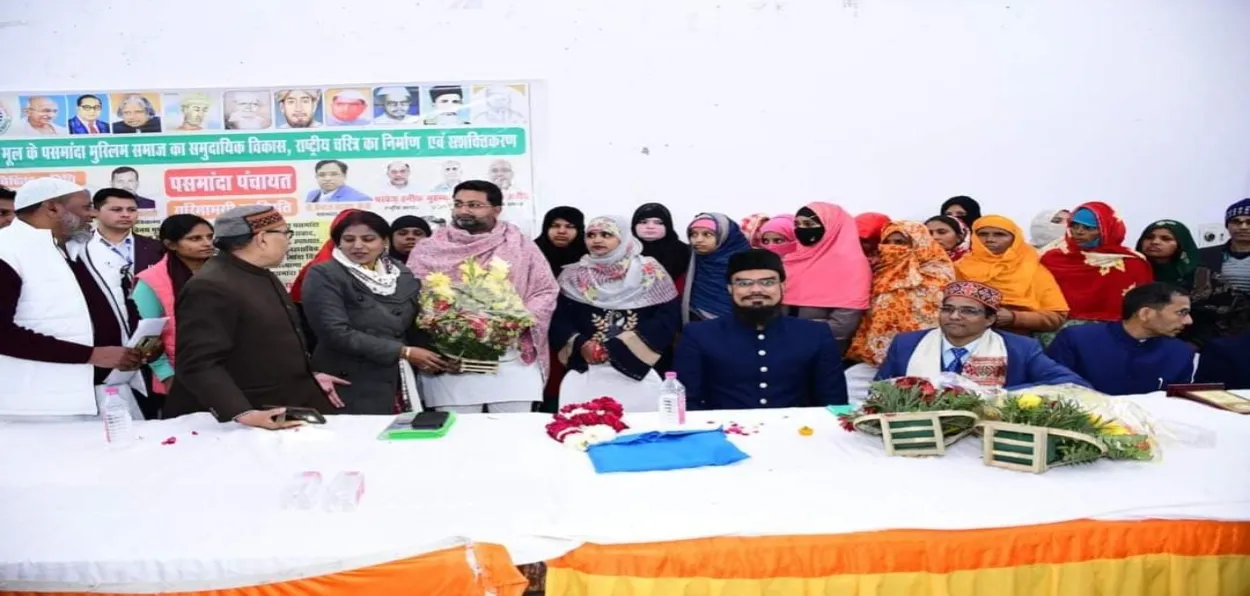
Abdullah Mansoor
The BJP is actively working to include marginalized Pasmanda Muslims in its outreach efforts, aiming to address their specific concerns. Though the BJP has faced criticism for incessantly lacking Muslim representation, the saffron party is now making strategic moves to engage with this section of Muslims who constitute about 75 percent of the Muslim population in India.
Prominent Pasmanda activists spoke about the aspirations of the community as the BJP seeks to woo them at the 'Pasmanda Buddhijeevi Sammelan' organized by the party in Lucknow, Uttar Pradesh. The event itself signals BJP’s shift towards inclusivity, an effort to diversify its support base and bridge the gap left by the chronic neglect of Pasmanda Muslim communities by previous governments.
Recent changes in Muslim voting patterns reflect the impact of these efforts in addressing the social and economic concerns of Pasmanda Muslims. The social stratification of Indian Muslims delineates them into three main groups: the 'Ashraf' comprising approximately 15% of the population identified as upper castes; the 'Ajlaf,' denoting lower caste converts; and the 'Arzal,' representing the untouchables.
The marginalized 'Pasmandas' encapsulate socially, economically, and educationally disadvantaged individuals from both 'Ajlaf' and 'Arzal' backgrounds, with the latter subgroup integrating Dalit and backward-caste Muslims. The term "Pasmanda" refers to those who have lagged, and are marginalized and oppressed among the Indian Muslims.
The Pasmanda movement emerged as a result of the discrimination faced by ‘lower caste’ Muslims, after the Mandal Commission movement of the 1990s. Acknowledging this historical oppression while speaking at key BJP conventions, Prime Minister Narendra Modi urged his party men to reach out to the fringes of minority communities. More recently while addressing the booth-level BJP workers in Bhopal, Modi asked for the need for discussions on this issue. He highlighted the discrimination against various Pasmamda communities like Mochi, Bhathiara Madari, Julaha, Lohar, Tejaa, Laheri, Haldar, stating that these communities have faced unjust biases that generations, Jogi, have endured.
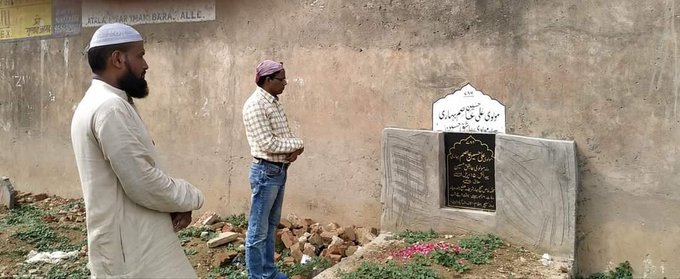 The grave of first Pasmanda leader Maulana Aasim Bihari in Bihar
The grave of first Pasmanda leader Maulana Aasim Bihari in Bihar
Muhammad Yunus, CEO of All India Pasmanda Muslim Mahaz, acknowledges the Prime Minister's focus on Pasmanda Muslim welfare, sparking political debates. While the BJP includes them in election strategies, the opposition views it as a divisive plan. Despite Muslims being 20% of the population, about 80% of Pasmandas are marginalized. The BJP argues for their representation in democracy, while the All India Pasmanda Muslim Mahaz supports the PM's decisions and seeks inclusive policies for the community.
Dr. Azeem from the Delhi School of Economics saw the BJP's outreach positively which has brought in the Pasmanda discourse in electoral narrative. Yet, Pasmanda Muslims remain skeptical of voting for the BJP due to its 'polarization' politics. Nonetheless, there may be a shift in Pasmanda's votes towards the party due to its outreach and welfare schemes. BJP's Action Plan: Outreach and Inclusivity Pasmanda Muslims constitute over 80% of the Indian Muslim population and face discrimination, contrary to Islamic principles.
The BJP has thus become the first national party to address social justice within the Muslim community. Party President J P Nadda initiated extensive outreach programs in Uttar Pradesh for Pasmanda Muslims. This approach resonates with the community, as about 80% of BJP candidates in local elections were from marginalized Muslim communities.
Adnan Qamar, State President of Telangana, AIPMM, criticizes secular parties for neglecting Pasmanda concerns, contrasting with BJP's appointments of Pasmanda individuals to key positions. In the 2023 Uttar Pradesh urban local body elections, 395 Muslim candidates were fielded by the BJP, indicating a shift in their engagement with Pasmanda Muslims. This shift reflects the BJP's commitment to addressing social and economic challenges faced by this subgroup, contrasting with the traditional perspectives of other political parties.
Parvez Hanif, President of All India Pasmanda Muslim Mahaz, applauds Modi for initiating this historic debate and focusing on social justice and rights, challenging the narratives of secular parties. This shift signifies a broader movement towards addressing the concerns of the Pasmanda community beyond mere rhetoric and increasing awareness against religious conspiracies. The BJP's efforts to address the concerns of Pasmanda Muslims through governance initiatives underscore its commitment to tackling the socio-economic challenges faced by this demography.
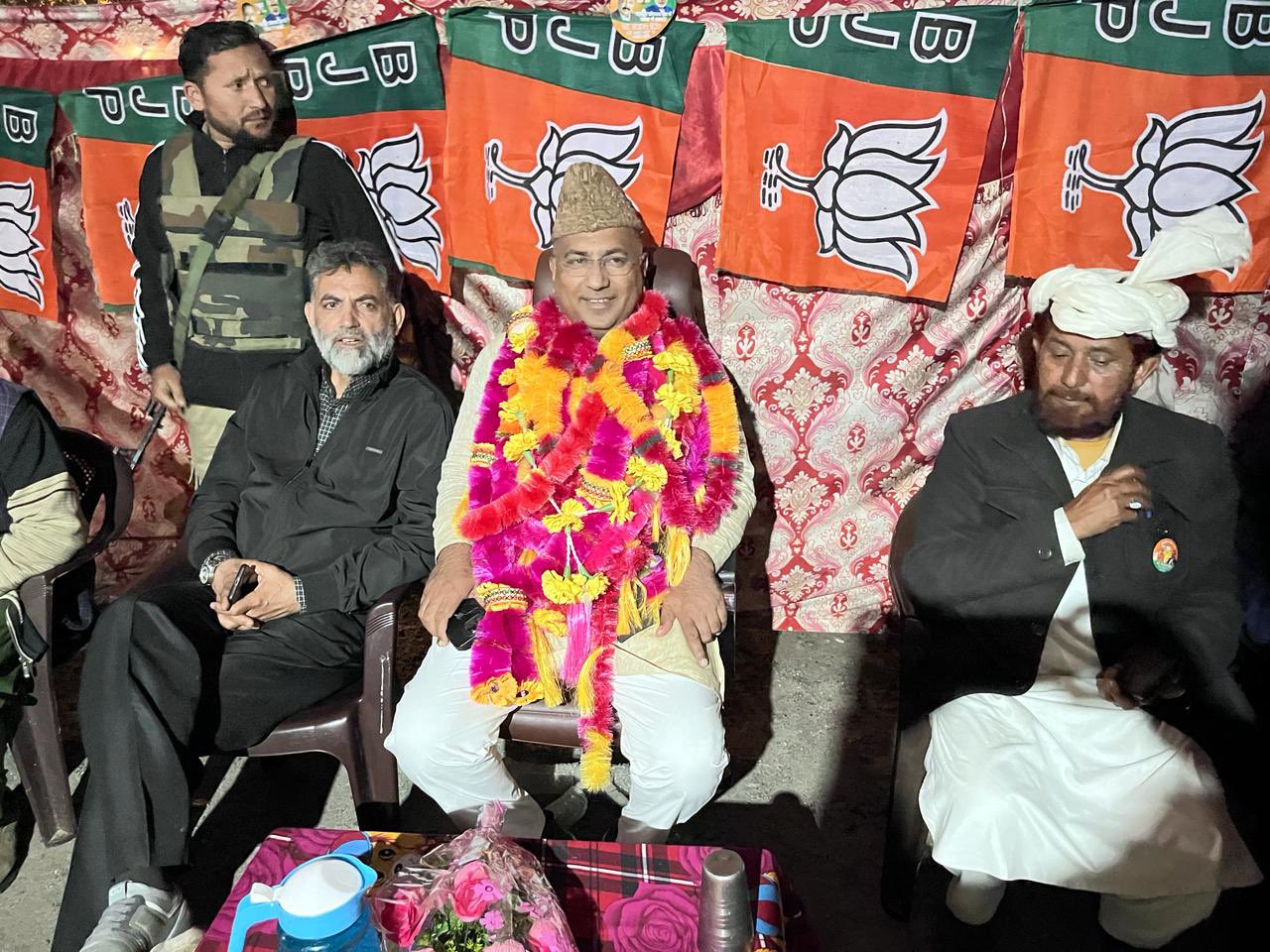
Ghulam Ali Khatana, Rajya sabha member from J&K
Columnist Amana Begam Ansari highlights the significance of political recognition for Pasmanda Muslims, emphasizing its departure from historical neglect. As a Pasmanda Muslim woman, being addressed as a significant voting bloc by a political party carries profound implications. This recognition marks a significant departure in the political landscape of independent India.
However, former Rajya Sabha MP Ali Anwar criticized Prime Minister Narendra Modi's apparent concern for Pasmanda Muslims as insincere, suggesting opposition parties should also use the term "Pasmanda" to counter the BJP's rhetoric. He spoke about issues like mob lynching and government actions disproportionately affecting Pasmanda communities. This critique reflects a broader trend where purportedly secular liberal political parties have historically garnered the support of marginalized Pasmanda populations by promising security.
Pasmanda activist Dr. Faiyaz Ahmad Fyzie acknowledged the role of ruling parties in exploiting communal polarization, with vulnerable communities bearing the brunt. He emphasized the importance of political empowerment in mitigating such incidents, noting the BJP's unique stance in addressing Pasmanda discrimination.
As society gains political strength, incidents of communal polarization may decrease, highlighting the need for prioritizing political empowerment. In light of these perspectives, voting for the BJP in the upcoming 2024 Lok Sabha elections could significantly impact the future of approximately 150 million Pasmanda Muslims.
Though the growing inclination of the Pasmanda community towards the BJP is visible yet the party faces as huge challenge in states like Assam, where the government’s actions are seen as against Muslims. Ohi Uddin Ahmad from Assam stated that controversy has surrounded the BJP government in Assam since 2016, particularly regarding actions such as the closure of government-run Madrassas and eviction drives. Despite these controversies, many government programs have received praise, leading to a positive perception among liberal Muslims. He blamed the state BJP is showing less interest in Pasmanda voters compared to the national party.
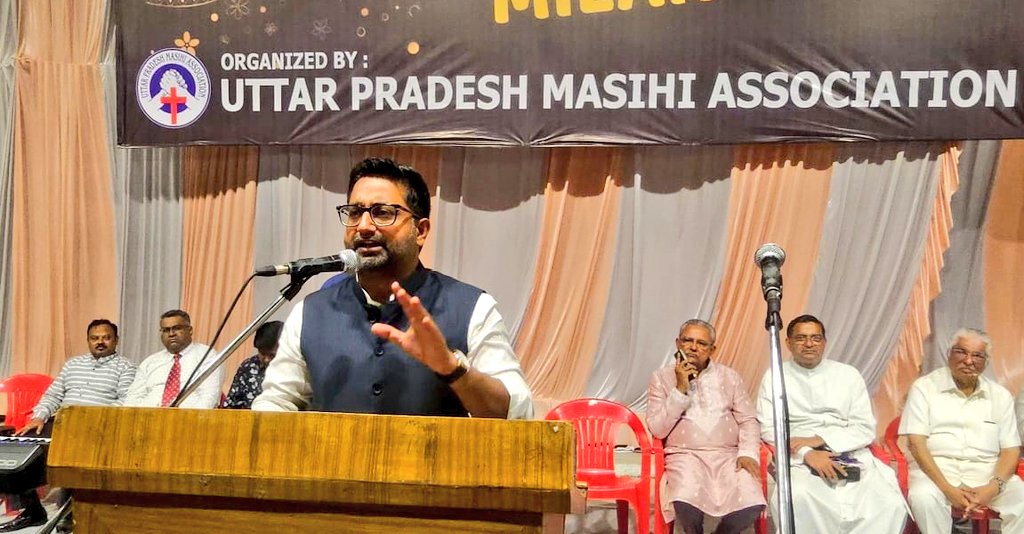 Minister Danish Azad Ansari, the Pasmanda face in UP cabinet
Minister Danish Azad Ansari, the Pasmanda face in UP cabinet
Despite obstacles such as the removal of reservation quotas in states like Karnataka, the BJP is perceived as capable of addressing the developmental needs of Pasmanda Muslims. The nomination of Gulam Ali Khattana, a Gujjar Muslim leader from Jammu and Kashmir, to the Rajya Sabha adds significance to the party's outreach efforts, particularly in constituencies with sizable Gujjar Muslim populations like Amethi and Rae Bareli.
The prevailing discourse around the upcoming general election is pegged around deflecting Pasmanda Muslims’ concerns from their livelihood and representation to leveraging religious and emotional matters to secure votes. This "Defeat BJP or Modi" strategy has adversely affected the community on multiple fronts. Firstly, their livelihood concerns fail to garner attention in mainstream discussions, with political parties neglecting to include them in their manifestos. Instead, these issues are relegated to secular-communal debates.
Secondly, the leadership within the Muslim community tends to be dominated by Ashraf leaders, who equate the development of the Ashraf class with the development of Muslims.
This proposed unified stand of Muslims overlooks the specific challenges faced by Pasmanda Muslims and perpetuates the FAKE narrative of equality within the Muslim community. Late Ashfaq Hussain Ansari, a Member of Parliament, highlighted the under-representation of Pasmanda Muslims in Indian politics. Analyzing the composition of the first to the 14th Lok Sabha, he found that out of 7,500 representatives elected, only 60 belonged to the Pasmanda group. In contrast, Ashraf Muslims, comprising 15% of the Muslim population, had 340 representatives.
Ashfaq Hussain Ansari's analysis underscores the unequal participation of Pasmanda Muslims in Indian politics, shedding light on the beneficiaries of minority politics.
PM Modi's emphasis on governance and acknowledgment of the backwardness among Pasmanda Muslims highlights the BJP's commitment to addressing social and economic challenges. The party's inclusive approach, as demonstrated through PM Modi's "Sabka Saath, Sabka Vikas, Sabka Vishwas, Sabka Prayas" model, portrays BJP as capable of benefiting marginalized Muslims through welfare schemes.
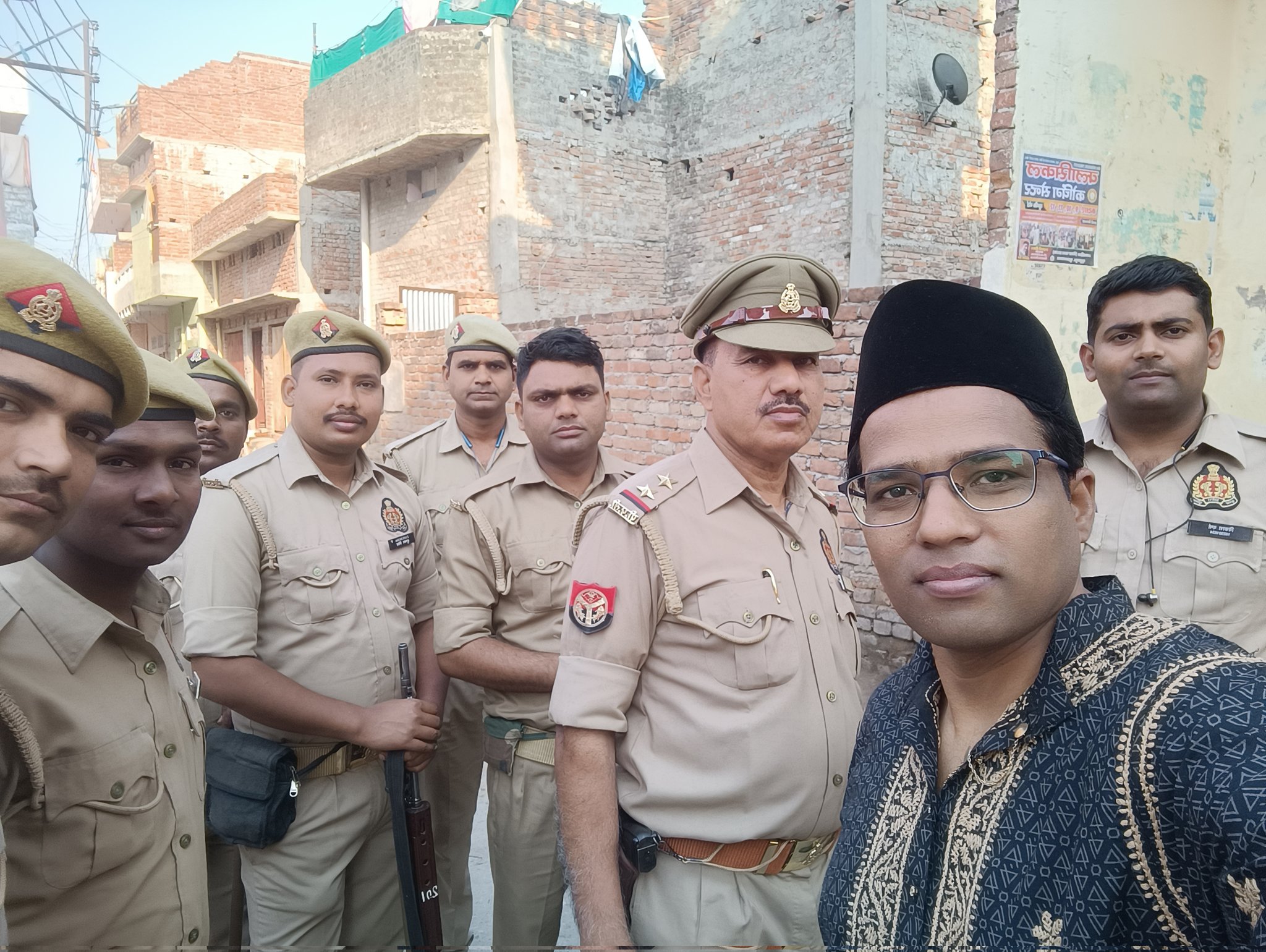 Pasmanda activist Faiyaz Ahmed Fyzie with policemen on Holi
Pasmanda activist Faiyaz Ahmed Fyzie with policemen on Holi
Key appointments of Pasmanda Muslims to positions such as ministers in the Alpasankhyak Kalyan and Wakf departments, the chairman of the Uttar Pradesh Alpasankhyak Commission, and others, indicate a genuine effort to address Pasmanda concerns. Dr. Aqueel Akhtar, a professor at the University of Delhi praised Prime Minister Modi and the BJP for their Pasmanda outreach program. He noted the beneficial impact of BJP policies, particularly in education, on marginalized communities, including Pasmanda Muslims. The BJP's engagement with Pasmanda Muslims reflects a shifting landscape in Indian Muslim politics, emphasizing socio-economic concerns alongside religious identity. This nuanced approach acknowledges the diversity within the Muslim community, signaling a departure from traditional religion-centric politics.
However, the BJP's outreach efforts may unsettle parties like the Samajwadi Party and Bahujan Samajwadi Party and upset their traditional approach on seeking votes of Muslims.
Looking at the 2024 Lok Sabha elections, the mapping of Muslim voting behavior indicates a significant shift. state elections in Uttar Pradesh in 2012, a small percentage of Muslim voters reported that they voted for the BJP candidate. By 2017,12.6% of general Muslims and 8% of Pasmanda Muslims supported the BJP. Interestingly, by the 2022 state elections, BJP support among general Muslims fell to 9.8%, while support among Pasmanda Muslims increased to 9.1%. While vote choice in state elections does not automatically translate to voting behaviour in national elections, the BJP’s recent inroads with the Pasmanda community — along with targeted 2024 election outreach — suggests that increased Pasmanda support for the BJP is possible.
The BJP's engagement with Pasmanda Muslims requires a delicate balance between embracing new perspectives and maintaining ideological principles. Ensuring the safety of Pasmanda Muslim communities is crucial, given the vulnerabilities they face under the guise of Hindu ultra-nationalism. Addressing contemporary inequalities within societal groups is essential for restoring constitutional rights and fostering national progress and unity.
ALSO READ: Agricultural scientist Moinuddin started his journey from Madrasa
The BJP's outreach presents an opportunity for dialogue and inclusion, but genuine representation and acceptance are ongoing challenges. The uncertain impact on other political parties underscores the need for balance in Indian politics. Should the BJP provide robust assurances regarding the protection and representation of Pasmanda Muslims, it could signal a transformative shift in Indian Muslim politics away from Ashraf dominance. P
The writer is a Pasmanda activist and also manages a YouTube channel named PASMANDA DEMOcracy
